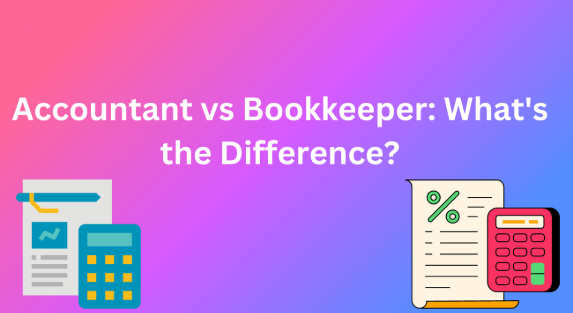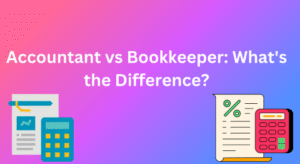Introduction: Why It is Important to Know the Difference
Financial data plays a significant role in every business, whether new or mature, in making informed decisions, developing effective strategies, and adhering to regulations. Confusion comes, however, when it comes to dealing with these numbers, and there is usually uncertainty as to the job of a bookkeeper as compared to an accountant, especially when both are misunderstood. Do they coincide? Is it so that they provide similar services? Or does your business require the two? Many accounting firms in Brisbane often address these concerns for local businesses.
It is vital to comprehend the dissimilarity between bookkeeping and accounting to enable correct financial decisions to be made. Although both of them work with financial data, they have various purposes, need different skills, and contribute to business development at various development phases.
This blog identifies the difference between bookkeeping and accounting, the roles of each profession, and how you can determine the services that your business may require.
What Is Bookkeeping?
Bookkeeping is a process through which one records financial transactions that he/she may have on a daily basis. It is the basis of the financial records of the business and a guarantee that all the sales, purchases, payments and money received are logged appropriately.
Using software, including Xero, QuickBooks, or MYOB, bookkeepers usually do the following:
• Document finance transactions
• Classify revenues and expenditure
• Balance of bank statements
Account receivables and payable management
• Account invoices and receipts
• Make simple financial records
Bookkeepers do not typically deal with complex financial analysis, complex decision-making or compliance work such as tax-filling. Rather, they make sure the daily figures are current and sorted out to be used further.
Consider a bookkeeper as a financial engine that keeps the wheel in a nice condition and reflects where your money is and what it does.
What is the Job of an Accountant?
Accounting on the other hand is a more strategic and wider role that interprets, classifies, analyses and summarises the information in the form of financial data accumulated by the bookkeepers.
Accountants are trained personnel who are usually professionally qualified (usually possessing qualifications like CA, CPA or ACCA) and usually do the following:
•Salary calculations (P&L, balance sheets, cash flow)
Budgeting and forecasting
•Filing and tax planning
•Support and preparation of audit
Business performance analysis
•Protection against regulatory standards
•Counselling of monetary applications and choices
In the areas where bookkeeping is transactional, accounting is analytical. Accountants see the numbers to provide responses to important business questions such as:
• Are we making money?
• Are we paying tax?
• Are we able to invest in new apparatus or open more places?
An accountant is a financial adviser, who guides companies to know what these numbers indicate and what should be done next.
Important Distinctions of Bookkeeping and Accounting
As closely related as bookkeeping and accounting may be, they are vastly different in terms of functionality, scope, skills, and purpose. The main aim of a bookkeeper is to make a documentation of the daily financial activities of a business which includes; sales, purchasing, receipt and payment. They are quite transaction-oriented whose role is to ensure that the accurate and current financial records are in order. On the contrary, an accountant has a more analytical and tactical job. Accountants analyse and interpret financial data and transform simple numbers into informative reports and facts that guide business models.
Bookkeeping is narrower and includes such activities as expense categorisation, accounting payable and accounts receivable, and reconciliation of bank statements. Accounting has a wider scope of duties such as budgetary analysis, taxes, financial reporting, and compliance. Bookkeepers generally can use financial software such as Xero, Quickbooks or spreadsheet software and do good data entry. Accountants, in turn, use higher levels of financial analysis and tend to utilise more detailed tools of analytics or accounting to conduct the work.
Bookkeepers are not necessarily required to have formal qualifications but training/accreditation can be beneficial to them. Accountants tend to be formally qualified accountants, often being designated with the letters Chartered Accountant (CA), Certified Public Accountant (CPA) or some other mark. In the case of reporting, bookkeepers make simple financial balances and books and the accountants draw out formal/professional financial reports including profit and loss accounts, balance sheets, and cash flow statements. Moreover, accountants may also tend to offer a broader advisory service, not only enabling it to give its strategic guidance and financial planning advice but also to make certain it is able to work with a bookkeeper to ensure that it has a greater degree of advisory impact.
When to have a Bookkeeper in business?
Bookkeepers will be the first people that a business hires when it comes to finance especially in the initial stages. You require a bookkeeper in case:
• You are buried in invoices, receipts and expense tracking
You are interested in having good records at the time of paying taxes
You have to maintain the accounts payable/receivable
• You desire to manage a better flow of cash
• You are running accounting software yet have no time to service it
Just like an accountant, a bookkeeper makes sure that your records are in good condition with up-to-date information so that your accountant (or you) can avail of quality information to strategically make decisions or not suffer at the last minute to file taxes.
When should a Business have an Accountant?
Accountants interpret the figures where bookkeepers are keeping them. In case you:
• You require assistance with tax returns, BAS or payroll compliance
Do you want a business/financial advice
• Your target is to have realistic budgets and growth strategies
You are borrowing some money or want to be invested
• You are audited or you have to create financial statements
You have advanced to the stage when you need a CFO-type advisory
Accountants add financial knowledge to the process of strategic planning and are desirable when an organisation faces a milestone such as an expansion, raising funds, or a reorganisation.
Are Bookkeepers and Accountants in a Collaboration?
Ok yes: and they ought.
The jobs of bookkeepers and accountants are complementary, not competing positions. When the bookkeeping system is in good condition it makes the work of an accountant quicker and accurate. An accountant in his turn can instruct a bookkeeper on how to categorise, reconcile and report.
Most accounting firms such as Milan Accountants provide the seamless bookkeeping and accounting services thus maintaining continuity at the right place, remaining accurate and having a top-level strategic mind to take care of the one roof.
Role of Technology: The way cloud accounting can solve the gap
Accounting software stored on the cloud has confused the distinction between book accounting and accounting. Everything can be automatised by different platforms such as Xero and QuickBooks with data entry, bank feeds, and reconciliation, and bookkeepers and accountants can work together at the same time.
Small business owners are also getting insights previously restricted to accountants with live dashboards, financial reports, and real-time alerting. It is possible to use technology to:
• Financial visibility in real time
• Teamwork through distance employment
• Compliance / automatic check
• Efficient tax preparation
Nonetheless, although the manual work is minimised by the instruments, people require their touch. Bookkeepers clean up the entry of data and accountants convert the data into workable advice.
Which of the two should you hire first?
It is a matter of both the stage of your business and the objectives:
• Startup or small business: Begin with a bookkeeper to keep the daily record and economic purity.
• Expanding business: Hire an accountant to bring the business into compliance, budget, and financial planning.
• Medium to large business: Preferable to have the two working hand in hand, as an alternative, it would be to outsource a firm that provides full services.
Is it possible to have just one person to do both of these jobs?
Others provide both accounting and bookkeeping services, particularly, in small companies. The qualifications needed to play each role are however different. Any qualified accountant may usually do bookkeeping, however, a bookkeeper (with no additional qualifications) may not be permitted by law to do all accounting work – not least that which deals with tax or regulatory submission.
When you get the one who is good in both, make sure that he or she is well certified and insured to meet all your financial requirements.
Conclusions: Bookkeeping and Accounting (a Two-banger finance engine)
The financial engine of a business requires two key gears, bookkeeping and accounting. Bookkeepers set the foundation by maintaining clean, organised and up-to-date records. It is based on that foundation that accountants provide their insight and make sure that all is done according to the regulations and lead the business to financial well-being and prosperity.
The difference makes you hire smarter, manage better, and be confident in making strategic decisions.
We also offer services in bookkeeping and accounting according to your level of business and your industry at Milan Accountants. As a start-up or a developing firm in need of strategic financial advice or just reliable records, we can help you out in the process.







